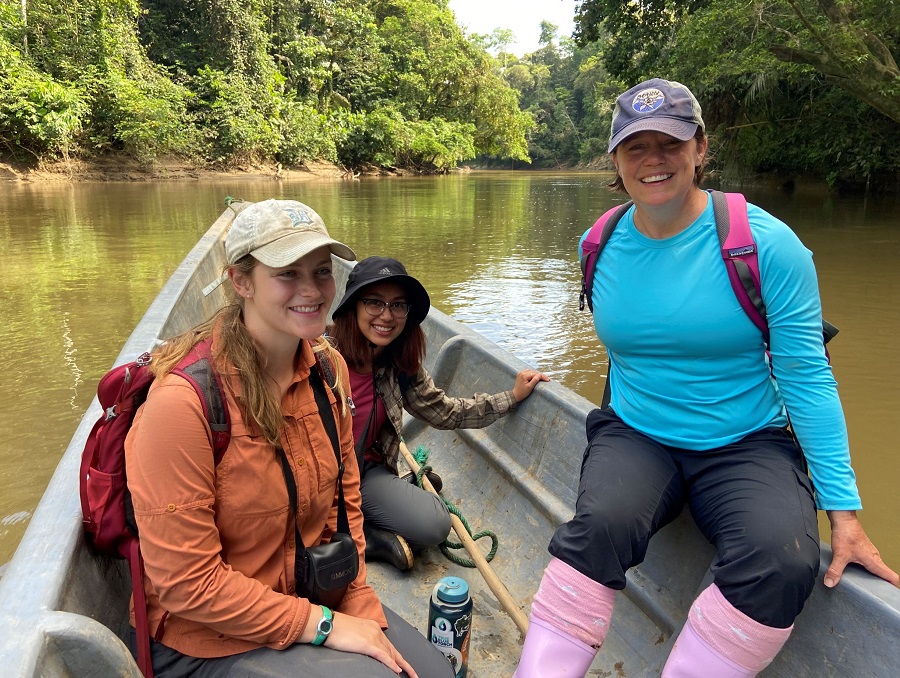A new area of graduate study at the University born out of the Hitchcock Center for Chemical Ecology will train students at the interface of biology and chemistry through cutting-edge approaches in ecology, genomics, bioinformatics and chemistry. The National Science Foundation (NSF) has provided a $3 million grant to support graduate students through the NSF Research Traineeship (NRT) Program.
“Some of the most exciting scientific discoveries will come from the intersection of traditional disciplines – in our case, the intersection of biology and chemistry,” Principal Investigator Marjorie Matocq, Foundation Professor in the College of Agriculture, Biotechnology & Natural Resources and director of the University’s interdisciplinary Ecology, Evolution & Conservation Biology Graduate Program, said.
“In order to prepare students for long-term success in multiple career paths, their graduate training needs to impart cutting-edge technical training, but also training in science communication, ethical conduct of research, and approaches to building and sustaining diverse teams of scientists,” she said.
Seventy graduate students are expected to receive support from the grant, further enhancing the Hitchcock Center’s highly successful interdisciplinary and international collaborations in the field of chemical ecology.
"Research collaborations across fields can be more challenging than you might think," Associate Professor Christopher Jeffrey, director of the Hitchcock Center who is leading the new initiative with Matocq, said. "This grant will support the training, research innovation and collaborations that allow us to pursue answers to the big questions in science that will require expertise in several scientific disciplines."
Benefits of the initiative have the potential to ripple far across Nevada, according to Matocq. The research can spur innovation among private companies in industries ranging from pharmaceuticals to agriculture, strengthen management of natural resources, and generate discoveries that will keep Nevada’s universities at the forefront of science and innovation.
“This prestigious award is a significant milestone for both the Hitchcock Center for Chemical Ecology and the University's strategic vision,” Executive Vice President and Provost Jeffrey Thompson said. “The deeply collaborative nature of the center's faculty has led to many remarkable scientific revelations that, without reaching across disciplines, would not have been realized. I expect nothing less from the work of these new NRT graduate students.”
The National Science Foundation, in fact, has identified research into the Rules of Life as one of its 10 “Big Ideas,” the bold questions that will drive innovative answers to the world’s most pressing problems.
The program was funded as part of NSF’s Understanding the Rules of Life (URoL) investments to identify generalizable rules that govern biological systems at micro and macro levels. Additionally, this marks the first grant to a Nevada institution through the NRT Program which has nearly $63 million invested in 22 programs nationwide.
“With the NSF funding support and inspired leadership in Marjorie, this is another outstanding and experiential learning opportunity for students to enhance their educational experience at the University,” Mridul Gautam, Vice President for Research and Innovation, said. “The NRT program will continue to help the University produce a highly prepared workforce.”
Joining Matocq and Jeffrey in leading the new initiative are two colleagues from the University’s College of Science: from the Department of Chemistry, Research Assistant Professor Casey Philbin; and from the Department of Biology, Assistant Professor Lora Richards and Foundation Professor Lee Dyer. The University’s Hitchcock Center for Chemical Ecology will provide a nexus of support for students in the new graduate training program.
The University is uniquely positioned to train researchers in the chemistry of biological Interactions because of its world-renowned faculty in chemical ecology, as well as recent investments in technology to support their work, according to Matocq. Those faculty members have extensive networks of research collaborations around the world, adding to the breadth and depth of student training, as well as improving their employment prospects.
“Recent technological advances have created unprecedented potential for discovery in this area, but these discoveries require the pulse of innovation that can only come from the engagement of graduate students,” Matocq said. “This program will be a model for training the next generation of scientists who will lead research into some of the world’s most pressing problems.”












